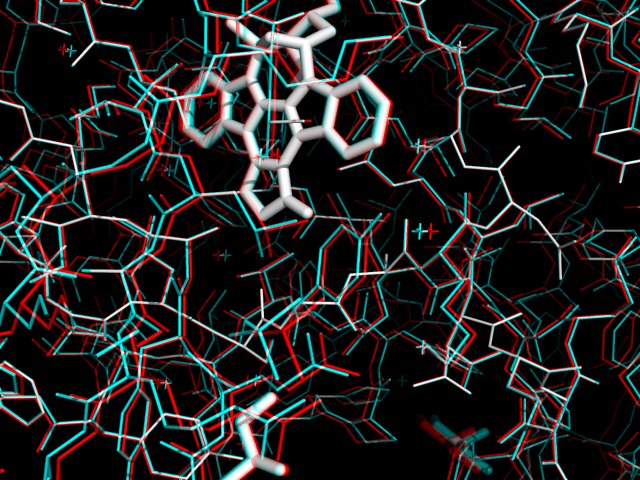Stereo Mode: Difference between revisions
Jump to navigation
Jump to search
Exesposito (talk | contribs) |
mNo edit summary |
||
| Line 45: | Line 45: | ||
set stereo_mode, integer | set stereo_mode, integer | ||
</source> | </source> | ||
== Notes == | |||
=== Anaglyph Color Quality and Ghosting === | |||
To test the quality of your glasses and coloring, you can test for "ghosting". Choose a part of the structure where the channels for the left and right eye are nicely separated in space. Hold one lens over the part of the structure and see you see one image or if there is a faint second image for the other channel. Then hold the other other lens over the image and see if there is a faint second image. | |||
== See Also == | == See Also == | ||
Revision as of 12:02, 5 December 2011
Overview
Sets the type of stereo mode for stereo.
PyMOL supports the following stereo modes:
1
- quad-buffered
2
- cross-eyed
3
- walleye
4
- geowall
5
- sidebyside
6
- stencil by row, Zalman
7
- stencil by col,
8
- stencil checkerboard
9
- stencil custom for developers
10
- anaglyph (requires green/magenta glasses)
11
- dynamic polarization
12
- clone dynamic
Syntax
set stereo_mode, integer
Notes
Anaglyph Color Quality and Ghosting
To test the quality of your glasses and coloring, you can test for "ghosting". Choose a part of the structure where the channels for the left and right eye are nicely separated in space. Hold one lens over the part of the structure and see you see one image or if there is a faint second image for the other channel. Then hold the other other lens over the image and see if there is a faint second image.
